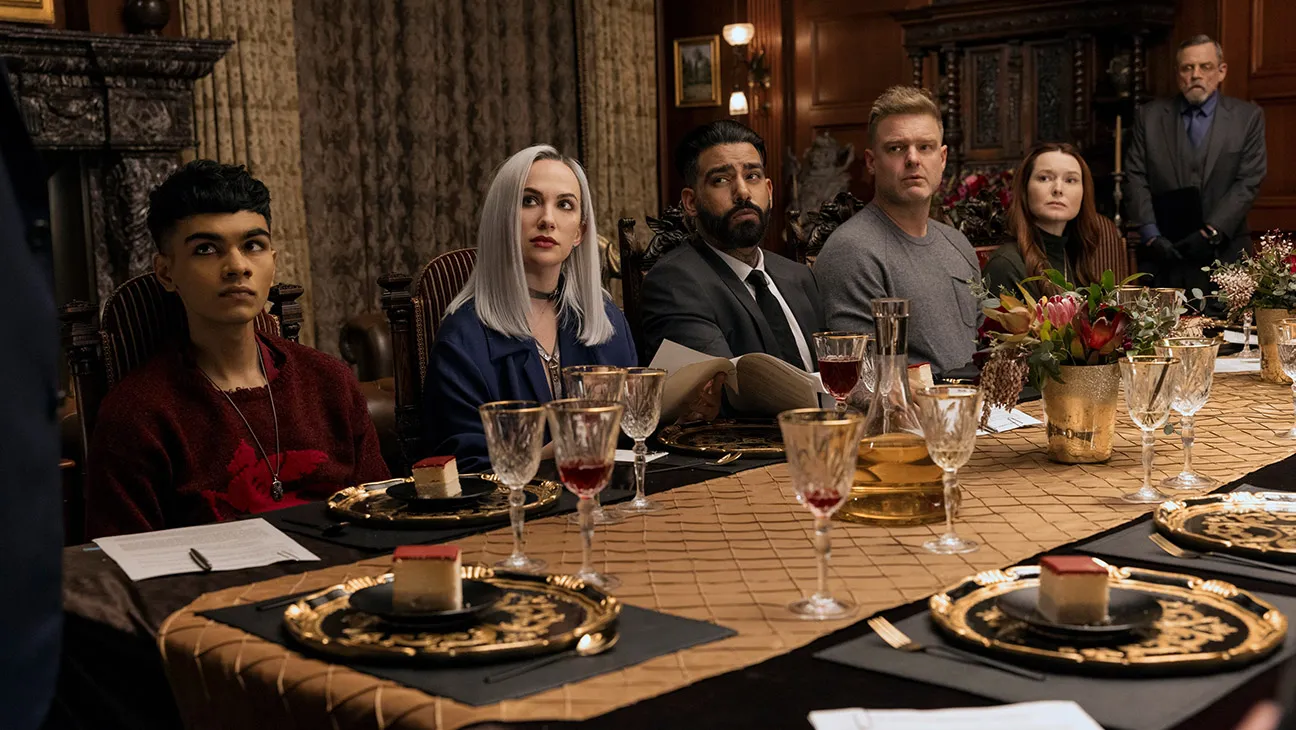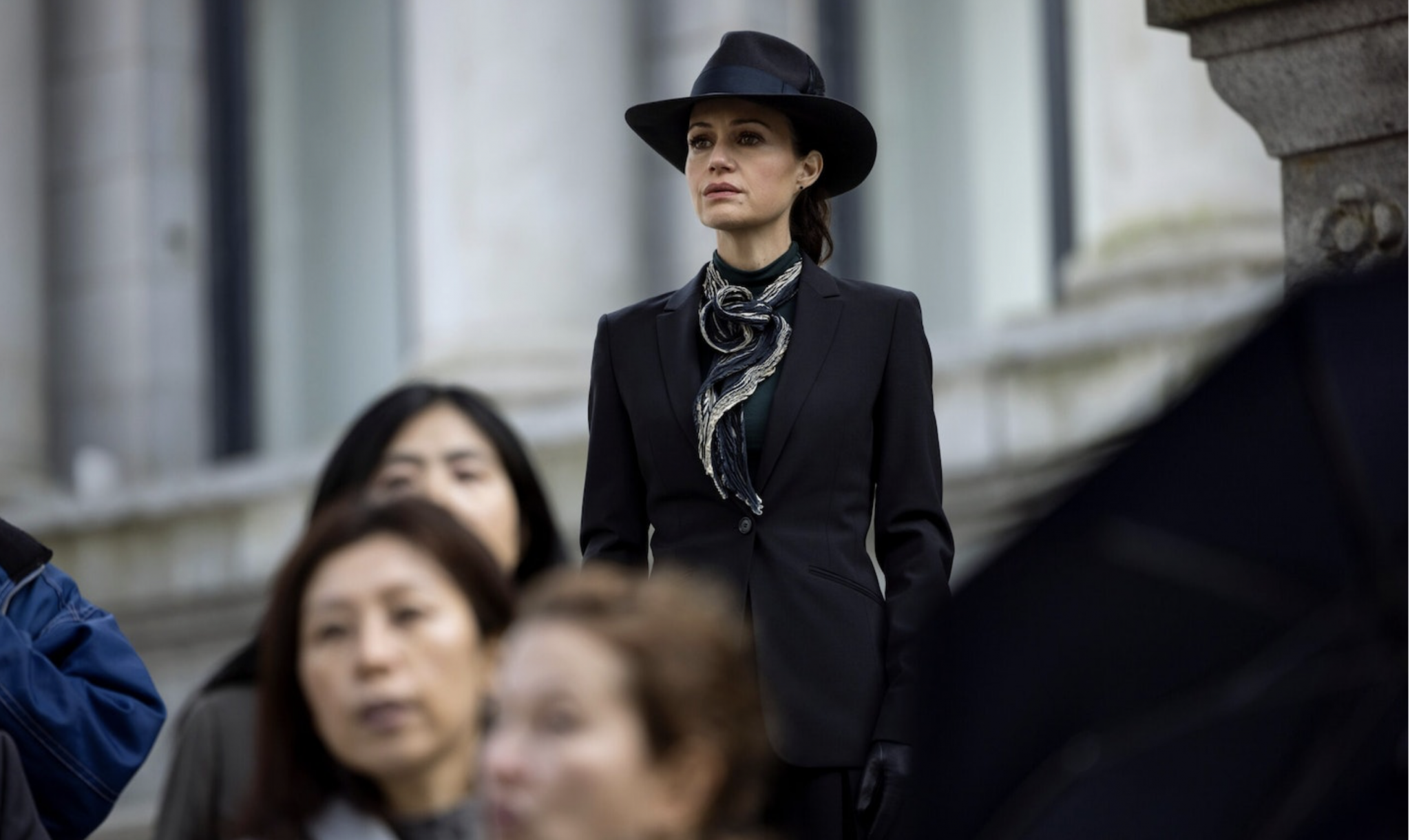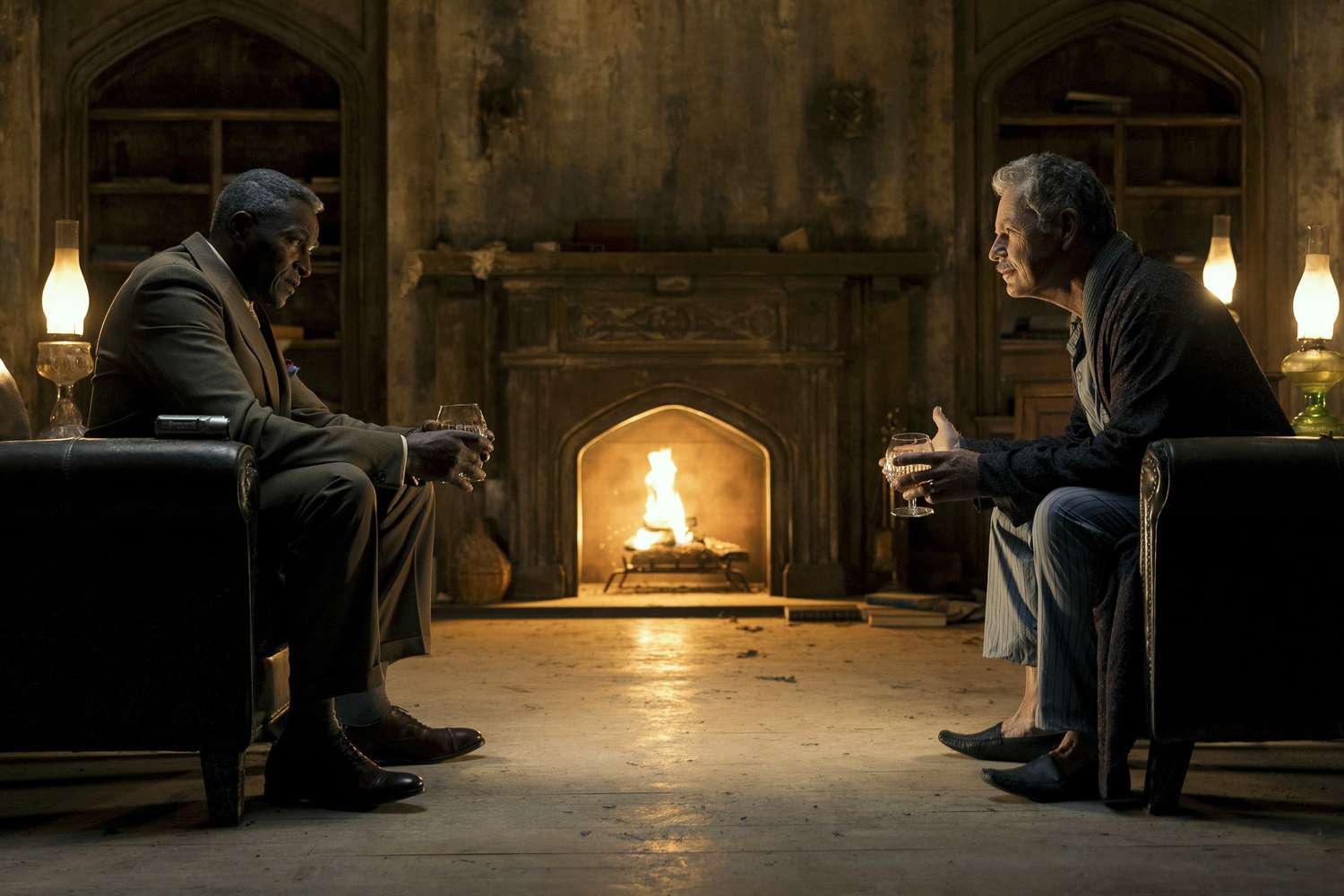Welcome to the Heavy Spoilers show, I’m your host Paul, and in this video, we’re breaking down “The Fall of the House of Usher.”
Mike Flanagan has been absolutely killing it on Netflix, and this feels like a culmination of all the shows and films he’s made over the last handful of years. That includes the cast too, with us getting lots of the actors he’s worked with before making major appearances. There are also lots of nods and easter eggs that point to his work that we’re going to be breaking down in this video.
“Ooo ooo Ouija Board…that’s a nod to his movie ‘Ouija: Origin of Evil’…hey, same actress too.”
Anyway, we’re going to be breaking it all down, and heavy spoilers ahead for what we’re about to talk about. The show is definitely worth seeing unspoiled, and I highly recommend that you see it first. With that out of the way, a huge thank you for clicking this, now let’s get into “The Fall of the House of Usher.”
THE FALL OF THE HOUSE OF USHER BREAKDOWN
Now, like a lot of Flanagan’s work, this is loosely adapted from some famous source material. Pulling from the Edgar Allan Poe short story that followed a narrator going out to Roderick Usher who was suffering from an illness.
Noticing cracks in the home, we learn that Roderick and his sister Madeline are the only remaining members of the family. Madeline too has been struck down with an illness, which in the book is similar to the death-like trance we see her mother in at one point.
She’s buried and entombed but she ends up coming back to attack her brother.
This of course gets built upon in the show, with it being a motif that’s in the finale.
In the end, the narrator flees the house and watches it literally fall apart from the cracking and drop into the sea.
Now, as in the case of all Flanagan’s work, these brief tales are greatly expanded upon, with us watching a character named August traveling out to Roderick Usher’s childhood home.
Roderick is played by Bruce Greenwood, who worked together with Flanagan on “Gerald’s Game.” This film actually pops up at roughly the 35-minute mark during episode six, and we see it on Netflix along with other titles.
We discover that he could’ve been a poet, which may even be a nod to Edgar Allan Poe himself. However, he went on to become a ruthless business tycoon who’s even happy to have his wife addicted to his opioid for the positive PR.
Here, he pretty much tells his life story and discusses the deaths of all of his family members, carried out by a mysterious woman.
August is played by Carl Lumbly, who you might recognize from Flanagan’s “Doctor Sleep.” There’s also a nod to “The Shining” as well when we hear a song from it being played at Mr. Longfellow’s.

“That is, it’s all forgotten now by Ray Noble, with Robert Longstreet appearing in ‘Doctor Sleep’ too. I dunno if I should go through every single actor cause there’s pretty much all of them, but yeah, it’s another family affair with his big list of actors.”
Now we discover that Longfellow’s is actually Roderick and his sister’s father. She worked as a secretary at the company he runs, and the pair had an affair which created the children. They were shut out from their father’s home and literally walled out of it, which came to affect Roderick in the future.
He ends up having several children with several women, but rather than shutting them out, he decides to welcome them all in.
Family is a very important motif throughout a lot of Flanagan’s work, and he often centers episodes around certain members to tell their stories. This is something we saw in things like “Haunting of Hill House,” and it works really well in the series to introduce us to all the characters.
Now Roderick and Madeline’s mother is struck down with illness, and after they bury her, she ends up rising from the grave and murdering Longfellow.
Now we see a lot of the backstory of Roderick and his sister as they try to make their way up through the ranks of the company. Running a pharmaceutical empire, this is clearly riffing on Purdue, with Roderick introducing a new prescription drug into the market.
This is called Ligadone, with it working as a stand-in for OxyContin, even down to riffing off the “no more pain” tagline.
WHO IS VERNA IN THE FALL OF THE HOUSE OF USHER?
Destroying countless lives all in the name of profit, they’ve managed to amass an empire that’s made them almost indestructible. However, this is about the fall of Usher, and we see as the family are taunted by a mysterious woman named Verna.
Now though she’s seen as the personification of death, I actually think there’s another potential that we could have here.
Verna, as a word, means Spring Green, and there is a possibility that she may even be Mother Nature.
Huge shoutouts to Mo from The Streamr who told me about his theory on this, and after thinking about it, I think it makes a lot of sense.
Verna is also an anagram of Raven, which is probably the most famous thing in all of Poe’s work.
We learn that she’s been parts of major empires throughout history where people have gone on to do great things. She doesn’t necessarily represent death because she offers people deals, and in exchange, they give up the collateral of something they love.
Thus, I think it goes beyond just being the personification of death, and instead, she’s a more straightforward supernatural being. You could even liken her to God, as first, she giveth, then she taketh, with her being a force of karma.
We discover that on New Year’s Eve, she offered the siblings a deal in which they could live lavish lifestyles, but their children would inherit the debt. This would end the Usher bloodline, with her killing all those connected to the pair in an ironic way.
For example, we see Prospero Usher’s getting brought in potentially because of how Fortuna’s messed up the environment. In the end, he’s killed by what’s basically acid rain, which makes the punishment fit the crime.
My man, the cat killer, is killed by a cat, and all the heart surgery stuff…yeah, you can draw the connections.
Now though I went that way with Verna, it might not be the case, and I’d love to hear your thoughts on who you think she really is.
She too brings up what the other characters could’ve been in other lives, and yeah, she might be death or the devil or even something we haven’t mentioned. She does judge people and line out their deaths and also revives Roderick when he tries to take himself out.
There’s definitely this air of mystery to the entire thing, with us also hearing about a mystery informant in the family that doesn’t actually exist.

Now, as things ramp up, we start to learn more about Roderick’s past and how he was initially part of the Fortuna expose. Roderick’s signature had been forged by his boss, and August contacted him as a way to bring the company’s misdeeds to light.
Working tirelessly, they constructed his testimony, but at the last minute, Roderick flipped and said he signed the forms. This got him a lot of goodwill at the company, and he’s promised the world by his boss Rufus. Rufus is sort of someone I see as being akin to Verna, but him being more of a literal evil man than symbolic.
Appearing as a jester throughout due to what he wears on his final night, this symbol metaphorically represents chaos.
Rufus represents the man that Roderick will end up becoming, with his focus solely being on money, no matter the cost. Now Rufus was willing to use Roderick because he’s happy to have stooges. Throughout the series, we get the tease towards something being buried behind a wall in the basement of Fortunato, which we later learn is indeed him.
This ties back to the opening of the series in which Pink Floyd’s “Another Brick In The Wall” plays. That song was about taking down authority figures, which their ending of Rufus represents.
After taking the fall at the company, Roderick is in the right place at the right time to take over.
Rufus actually offers them the jobs like COO that they end up getting from Verna, and it’s kind of wild how much foreshadowing there is in the series.
Still, though, they go ahead with it, however, the pair needs to have an alibi, and thus they head out to a bar, which is where they meet Verna.
Making a deal with the devil, where they’ll never be caught, they end up also gaining enormous wealth for them and their family. The series very much asks questions of greed and selfishness and whether it’s worth destroying others to get material things. Is that worth your quote-unquote soul, and yeah, seeing the two take the deal is played as a mistake.
Now they’re told that they came into the world together and had to go out together. Both in the book and show, Madeline and Roderick are twins, with it being more of a sort of…sort of reveal in the source material.
There’s a lot of other nods to Poe’s work like bells, black cats and Ravens with these symbols of death lining the series. Lenore plays a big part along with the raven and the words Nevermore. I love how Madeline makes an AI bot that copies someone’s social media posts and after Lenore dies it just keeps texting Nevermore.
Now, “The Narrative of Arthur Gordon Pym” was his only complete novel and that centered around a great expedition similar to what we hear the characters’ backstory to be. Played by Mark Hamill, he’s their right-hand man who too gets offered a deal that he’s strong enough to turn down.
This is because he doesn’t have any attachments and he’s kind of as shallow as the Ushers. He’s given up his life to basically gain nothing important which is reflected in the other characters.
“Tamerlane” is about a conqueror, Napoleon comes from “The Spectacles”, Victorine comes from “The Premature Burial” based on that name…skipping around it because I can’t pronounce that surname, Eliza is named after Poe’s real-life mother, Augustus may be a nod to “The Pale Blue Eye” though I could be wrong on that, Camille is also from “The Murders in the Rue Morgue”.
The last major one I could find was Roderick’s wife Annabel Lee which too was a poem crafted by Poe.
This gets read aloud in the series and it centers around two people who were so in love that higher powers became jealous and punished them with death. I’m sure there are other characters in the series too that are based on his work, so if there’s any name I missed then drop them below.
Anyway, we learn that after taking the fall that Roderick’s marriage never recovered and that the kids ended up going to him because he offered money and power. The ghost of Annabelle even ponders that the children might have even died in their childhood, which we know happened due to the deal their dad made.
THE FALL OF THE HOUSE OF USHER ENDING EXPLAINED
In the end, it leaves just Madeline and Roderick with Lenore’s death breaking the latter’s heart. Getting a visual representation of his body count, he watches the pyramid of wealth he’s built laid out before him. The pharaohs were of course buried with their possessions, with this metaphor also carrying across to what happens with Madeline.
She ends up going to meet with him for a drink but soon realizes that he’s drugged it. Using mummification techniques to preserve her, he ends up attempting to send her off like an Egyptian Queen.
She ends up rising and attacking him while the house crumbles around him, and it comes crashing down, killing Madeline and Roderick.
Now August manages to make it out and he sees Verna standing about the toppled empire.
From here we see the consequences playing out and learn what happened to the other characters.
Arthur is given the 20 years that Verna promised him in the deal and Lenore’s promised legacy plays out too. We learn that her mother set up a foundation in her name. We hear that a decade later the foundation saves millions and millions of lives, changing the world for good.
Juno manages to get herself off the drug and she sets up something known as the Phoenix foundation.
This actually ties in with Arthur as he was told he could be like a phoenix rising from the ashes. He was also told though that he could end up watching it fly away, which is something that ends up happening. Due to Camille keeping a file on him, this is discovered and all of his misdeeds are brought to light.

He’s very much a patsy just like how Roderick was, with him being the only character who gets convicted from the scandal.
August ends up visiting the family’s gravesite and he says that he’s going home to his family, kids, and grandkids. Saying he’s the richest man in the world, we get the true idea of wealth being in family and not in the material things they were somewhat buried amongst.
Verna too visits the graves and leaves the material and superficial things they coveted.
Their need for power and wealth has cost them it all, with the family being brought down from within by their own greed.
It’s a cautionary tale about what the true cost of selling one’s soul can bring, and that closes out the series.
Now as for my thoughts on the series, I think this is another masterpiece from Mike, with it being all the things he’d learned from his previous projects rolled into one. Man has mastered the family formula, and though that sometimes means it’s formulaic, he’s still knocking it out of the park to the point I can’t really ding it for being similar to what he’s done before.
What I was really impressed by the most is how he’s actually managed to weave in pretty much all of Poe’s work into one seamless narrative that doesn’t feel forced. This is very much a love letter to him, and they beautifully encapsulate everything about the author into one piece that flows really well. I can’t imagine how difficult that would be but to bring it together as neatly as this was no easy task. You also have the characters too, who all feel like real fleshed-out people, and again Flanagan has brilliantly cast younger and older versions of the same characters expertly.
Now I personally think that “Midnight Mass” and “Haunting of Hill House” are above this, but to me, they were some of the best shows I’ve ever seen. This still ranks really high and hey, if you prefer it I’m not mad at you. He’s managed to once more make a horror show that has a soul and it goes beyond just being cheap jump scares. There is actual terror here but beauty here too and all in all, it’s about how damaging greed can be. There are lots of real-world metaphors you can apply it to, and they even sneak some digs in there at former presidents and corporate heads.
Still, though, with the key theme being family, I’m sure there’s a lot who will be able to relate to this and its message.
“The Fall of The House of Usher” was brilliant, and it gets a 9/10.
Now obviously I’d love to hear your thoughts, so make sure you drop them in the comments below.
Please drop a like on the video, and if you want to support the channel as a member of the Spoiler Society, then please click the join button.
You’ll get early access to videos every week, and it goes such a long way to helping us.
If you want to get some heavy spoilers merch, we’ve also got our t-shirt line located just below the video that will let you pick up all kinds of tops like our Theory Time one, House of the Dragon stuff, Marvel tees, and a lot more.
We drop new designs on there all the time too, so definitely keep an eye out for them.
Now if you want something else to watch, we have a video on screen right now.
With that out of the way, a huge thank you for sitting through the video, I’ve been your host, and I’ll see you next time. Take care, Peace.




Leave a Comment
You must be logged in to post a comment.